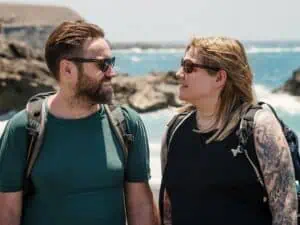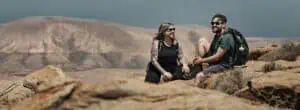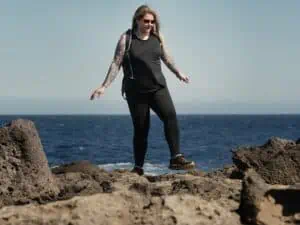This guide is part of The Wellbeing Toolkit in partnership with Shady Rays Impact, for more articles within this guide, visit the main resource hub.
About Shady Rays Impact: Shady Rays Impact is the charitable giving foundation for Shady Rays. They never wanted to settle for being a company that just sells sunglasses – they want to make a difference every day. Through research and talking directly to their fans, Shady Rays found the causes that give purpose to their work. Together, Shady Rays is helping people live healthy, courageous lives through some of their most challenging moments.So far, they’ve provided more than 25 million meals to fight hunger across America and removed millions of plastic bottles from our world’s oceans.Making an impact matters…and they’re just getting started.
There is every likelihood that at some point in your life, whether you’ve already experienced it or not, something will change that will have an impact on your ability to get out into nature as much, and perhaps be as outdoorsy as you’d have liked. This can be for a number of reasons:
- Change in finances – this may make it harder for you to devote the resources you once would have done to getting outside. Perhaps you don’t have access to a car as much, or the money you’d have once spent on trips away or fuel to take you there is reduced.
- Distance from locations – this could happen if you’ve had to relocate for your job, school or any number of reasons and you may find yourself further away from adventure and outdoorsy locations than you were in your previous location.
- Time – sometimes the things we have going on in our lives can have a big impact on the amount of time we get to spend on ourselves, and naturally, our hobbies can suffer here.
- Health and confidence – if you’ve been sick, developed a long term illness or disability, depression or any number of other concerns, it may not be possible for you to get outside as much as you’d like.
There are, of course a whole range of other reasons why your ability to get out and experience nature and adventures may have changed. If you’ve been feeling stuck, wherever you’re at, changing the narrative and trying to create workarounds to help you get outside more could be incredibly helpful to your overall sense of wellbeing.
So how, when our circumstances change, can we still make the most of our time in nature, and still feel that sense of adventure, even when it might feel impossible?
Below, we’ve outlined our tips to help you Change the Narrative around your outdoors experiences to get the most out of whatever lights you up.
Table of Contents
ToggleGet Creative
If your circumstances have changed and you find yourself facing barriers, without known solutions right now, it’s time to get creative. First, it’s really helpful to identify what it is in the outdoors and your previous adventures that you miss. Is it exploring new routes? Is it the sense of achievement that you get from summiting something? If you can identify with that feeling, there is a chance that you can find a way to bring that into your life again in a different way. For example, if you’ve moved to an area which is far away from huge mountain tops, or simply don’t have the resources right now to visit areas that give you that buzz, how can you emulate that closer to home? It might be a case of finding local community groups, or even a climbing gym to join. It could be searching out local parks and green spaces where you could go spend time or create your own routes. Getting creative can also be about looking into new ways you can experience things – for example, if getting to somewhere is the issue, are there any public transport options that could take you to new areas you’ve yet to explore? If you’d like to try something new, can you rent the equipment you might need to give it a try?
Top tip:
“Get creative with how you’re experiencing the world around you and give back at the same time. “Travel” to your local food bank for an activity that’s rewarding for both you and your community! Find your local food bank below”
— Feeding America
Work With Your Strengths
Sometimes, when things change, we find ourselves focusing on what we may have lost as a result – and this is only natural. However, if we can learn to look at what is possible for us, we can learn to work with what we have and make the most of its potential. For example, if you’re struggling to get outside into nature as much since you’ve developed a chronic illness, can you research trails in your area that are accessible with a mobility device or shorter trails that may feel right for you? Or are there other sports you could try that perhaps don’t need the same level of physical or mental activity but still gets your outside? If you’ve been struggling with depression, rather than looking at long, overwhelming hikes, could you look at breaking things down and heading out on much shorter walks to local parks? This also works really well if time is the problem, and you need to find ways to make the outdoors work for you on a shorter time frame.
It’s All About Framing
If your circumstances have changed, there’s a good chance you may be missing certain things you really enjoyed before, or the feelings that may have given you. Looking at your framing can be incredibly helpful here and reframing your sense of adventure. For example, if you’ve moved somewhere with less mountains but more local parks, are there community groups you could join that work on keeping the places you visit looking as good as can be? Or are there meet up groups that can allow you to build a sense of community in ways you perhaps haven’t looked at before?
Appreciate the Small Things
“When something drastic or tragic happens, you are forced to look at things differently,”says Eric Newman, founder and chief play officer of non-profit Roc Solid Foundation. “For the families we work with, when a child is diagnosed with cancer, everything gets flipped upside-down. Things that used to cause daily stress become less relevant, and there’s a shift to savouring every little moment together with family and friends. When that shift happens, families often come out of their tragic experience feeling grateful for this new perspective and all the love that surrounded them when they needed it most.”
Focusing on the big can sometimes cause us a lot of anxiety, especially in times where a difficult or traumatic experience may have occurred, or a big change has happened. Focusing on smaller things or smaller acts can make a huge difference in your day to day wellbeing. In anxiety management, the idea of breaking down larger tasks into smaller, less overwhelming ones is commonly used and this can be applied in any situation. For example, if you’re unable to get out as much, focus on ways you can still enjoy nature. Can you spend your lunch break outside on your balcony? Can you introduce more plants into your home? Or can you take shorter nature breaks in the evenings after work?








